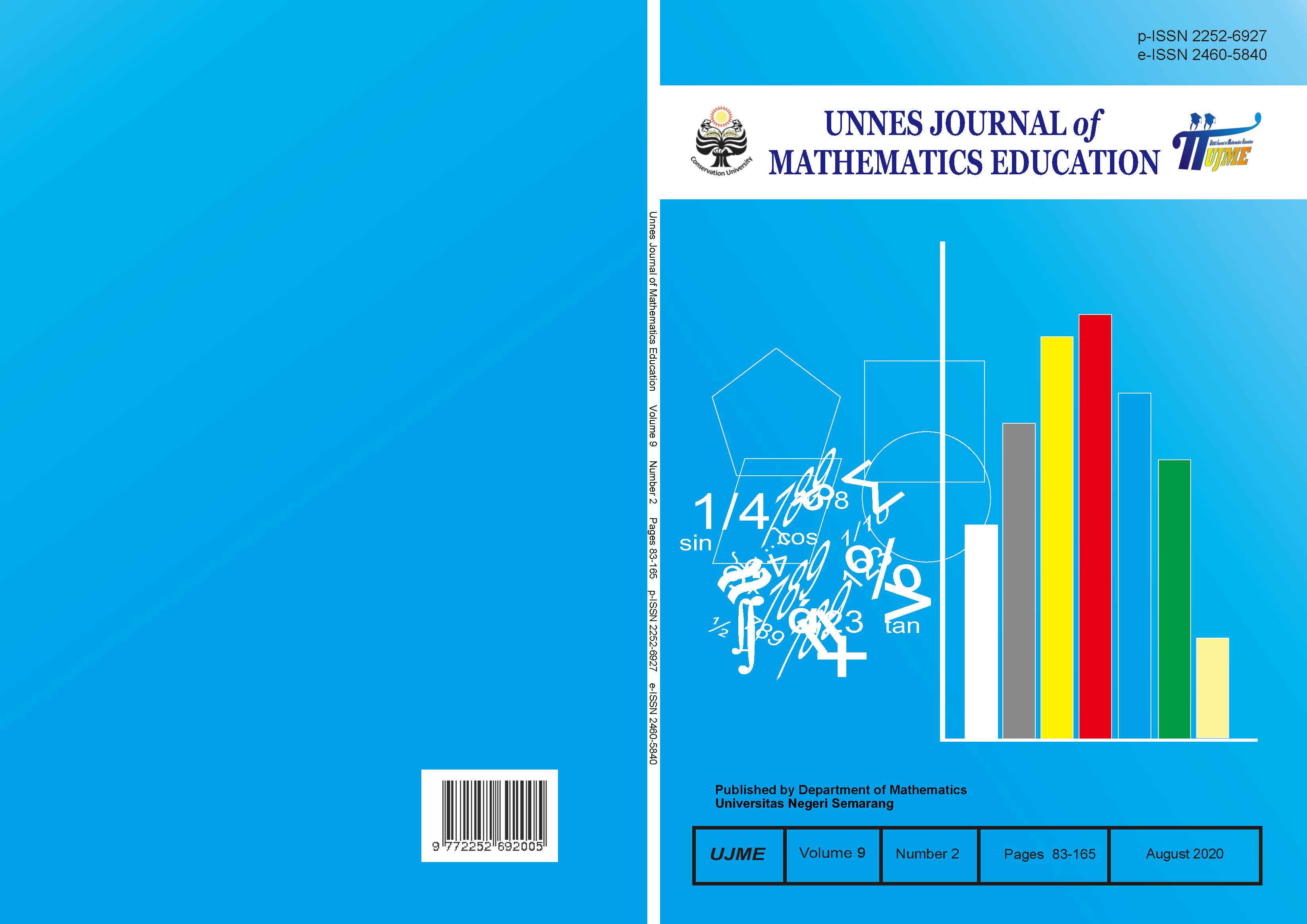The use of social arithmetic contextual modules on learning achievement in terms of interest in learning
##plugins.themes.academic_pro.article.main##
Abstract
This research aims to find out: (1) significant difference in students' mathematics achievement between the student who used the contextual social arithmetics module and who do not use it. (2) the difference in students' mathematics achievement among the student having high, medium, and low interest. (3) The interaction between contextual social arithmetics module and students' mathematics interest toward students' mathematics achievement. This research was quasi-experimental. The population of the study was the seventh grade of students of a Junior High School in West Borneo. The samples were 66 students. Data collection instruments using tests and questionnaires. The technique of analyzing the data was two-ways ANOVA. The results reveal that: (1) there is a significant difference in students' mathematics achievement between the student who used contextual social arithmetics module and students who do not use it. (2) there is a difference in students' mathematics achievement among students with high, medium, and low interest. (3) There is no interaction between the use of contextual social arithmetics module and students' mathematics interest toward students' mathematics achievement.
##plugins.themes.academic_pro.article.details##
References
Fane, A., & Sugito, S. (2019). Pengaruh Keterlibatan Orang Tua, Perilaku Guru, dan Motivasi Belajar terhadap Prestasi Belajar Matematika Siswa. Jurnal Riset Pendidikan Matematika, 6(1), 53–61.
Friantini, R. N., & Winata, R. (2019). Analisis Minat Belajar Pada Pembelajaran Matematika. Jurnal Pendidikan Matematika Indonesia, 4(1), 6–11.
Friantini, R. N., Winata, R., & Permata, J. I. (2020). Pengembangan Modul Kontekstual Aritmatika Sosial Kelas 7 SMP. Jurnal Cendekia: Jurnal Pendidikan Matematika, 4(2), 562–576.
Hamdani. (2011). Strategi Belajar Mengajar. Pustaka Setia.
Kurniawati, E. F., Kusmayadi, T. A., & Suyono, S. (2012). Eksperimentasi Pembelajaran Matematika Dengan Menggunakan Model Pembelajaran Problem Solving dan Model Pembelajaran Kooperatif Tipe Team Assisted Individualization (TAI) Pada Pokok Bahasan Persamaan dan Pertidaksamaan Linear Satu Variabel Ditinjau Dari Mi. JMEE, II(2), 92–110.
Lasmiyati, L., & Harta, I. (2014). Pengembangan Modul Pembelajaran untuk Meningkatkan Pemahaman Konsep dan Minat SMP. Jurnal Pyhtagoras, 9(2), 161–174.
Latifah, U. H., & Widjajanti, D. B. (2017). Pengembangan Bahan Ajar Statistika dan Peluang Berbasis Multiple Intelligences Berorientasi pada Prestasi, Pemecahan Masalah, dan Rasa Ingin Tahu. Jurnal Riset Pendidikan Matematika, 4(2), 176–185.
Partayasa, W., Suharta, I. G. ., & Suparta, I. . (2020). Pengaruh Model Creative Problem Solving (CPS) Berbantuan Video Pembelajaran Terhadap Kemampuan Pemecahan Masalah Ditinjau Dari Minat. JNPM (Jurnal Nasional Pendidikan Matematika), 4(1), 168–179.
Riyanto, Y. (2010). Paradigma Baru Pembelajaran: Sebagai Referensi bagi Pendidik dalam Implementasi Pembelajaran yang Efektif dan Berkualitas. Kencana Prenada Media Group.
Rosyida, N., & Jailani. (2014). Pengembangan Modul Matematika SMK Bidang Seni, Kerajinan, Dan Pariwisata Berbasis Open-Ended Problem Sebagai Implementasi KTSP. Jurnal Riset Pendidikan Matematika, 1(1), 35–47.
Rusman. (2012). Model-model Pembelajaran Mengembangkan Profesionalisme Guru. PT Raja Grafindo Persada.
Suastika, I. K., & Rahmawati, A. (2019). Pengembangan Modul Pembelajaran Matematika Dengan Pendekatan Kontekstual. Jurnal Pendidikan Matematika Indonesia, 4(2), 58–61.
Suprijono, A. (2012). Cooperative Learning: Teori dan Aplikasi PAIKEM. Pustaka Pelajar.
Zulfikar, R. N., & Tamrin, M. (2019). Pengembangan Modul Matematika dengan Pendekatan Metakognitif untuk Memfasilitasi Kemandirian Belajar Siswa SMK Muhammadiyah Kupang. Prosiding Seminar Nasional Integrasi Matematika Dan Nilai Islami, 194–197.
